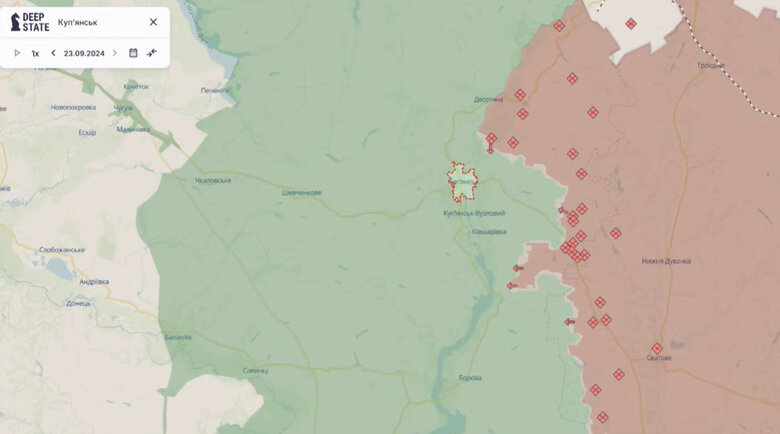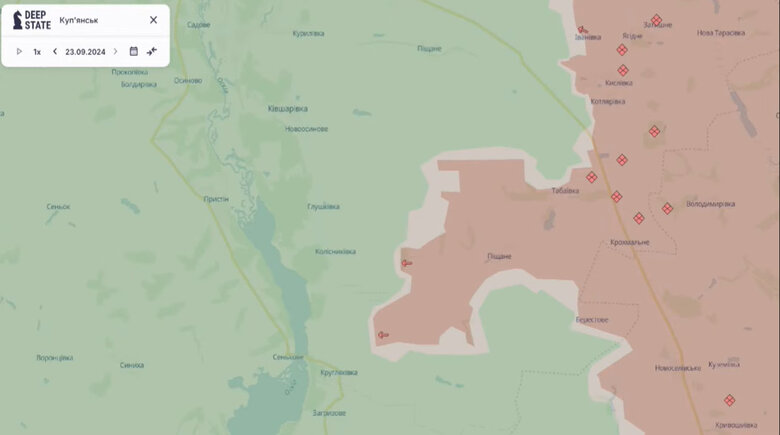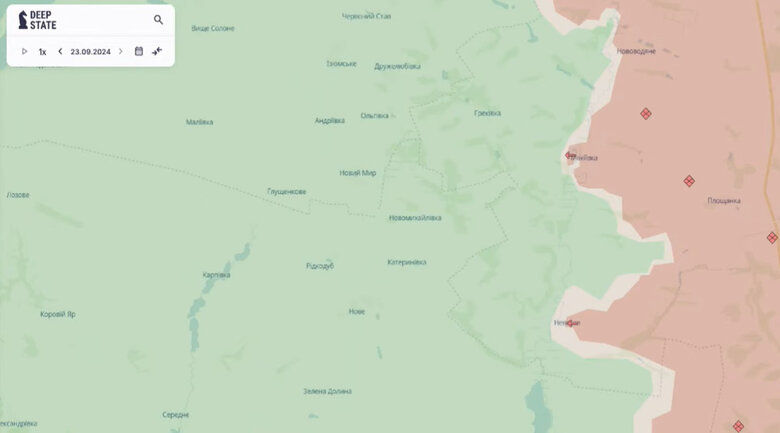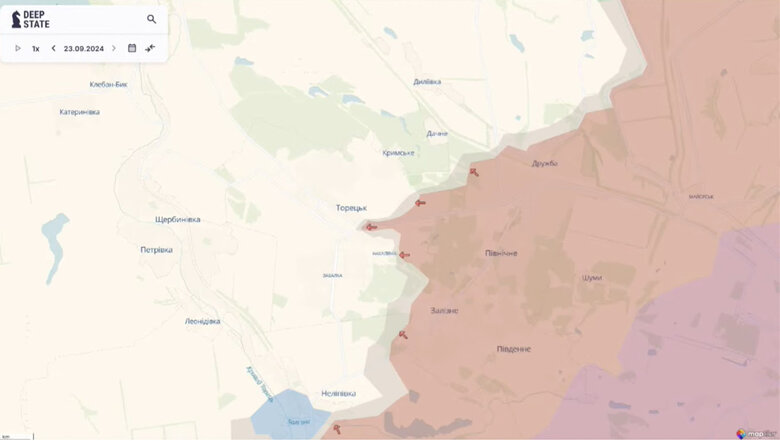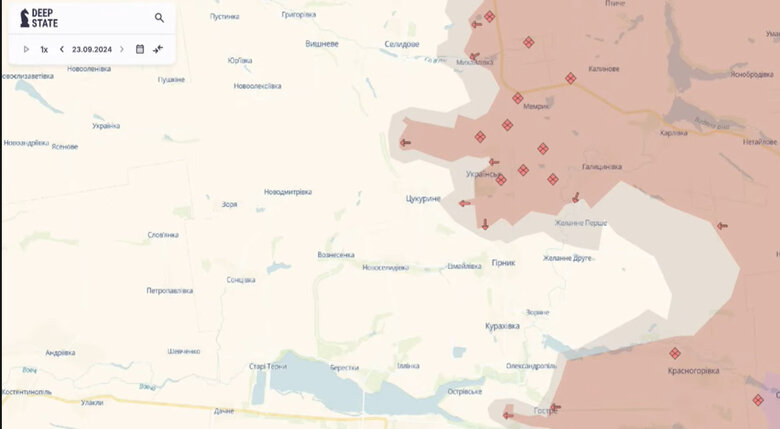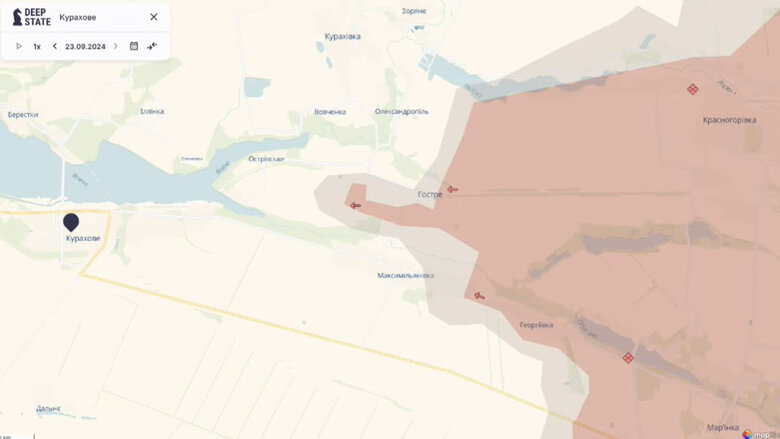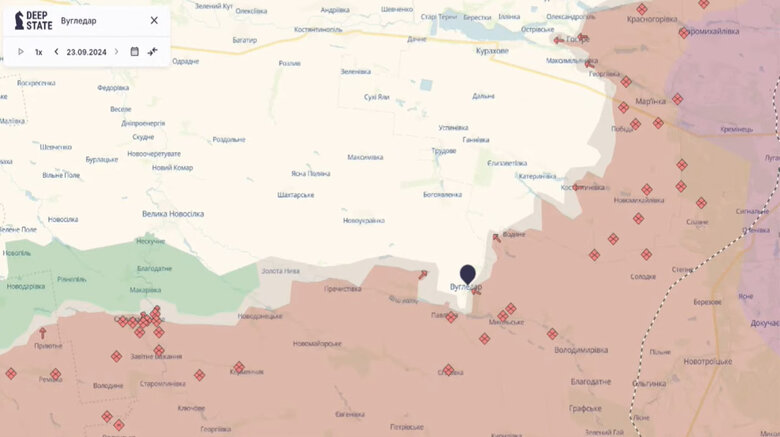Events at front: 23.09.2024
Yurii Butusov, Editor-in-Chief of Censor.NET, talks live about the latest developments at the front as of September 23, 2024.
September 23. Another stream about the events at the front.
What exactly is going on? The situation is changing quite dynamically and requires regular attention. I have just returned from Donbas, where I inspected several areas of very intense fighting.
I would like to thank the sponsors of Butusov Plus: it is thanks to you that I have the opportunity to go to the front, spend a lot of time there, and get information. And our team can prepare such streams. The 2,400 sponsors of the Butusov Plus channel allow us to do this. Thank you, dear friends.
The situation in the area of Kupiansk
The situation on the frontline in the area of Kupiansk is significantly escalating. The enemy is attacking Kupiansk from two sides. The enemy is conducting intensified massive attacks with infantry forces. However, they periodically try to throw infantry in and destroy our positions with armored vehicle columns. The most threatening situation is the one that is advancing day by day and, unfortunately, we are unable to stop this enemy breakthrough. This is a breakthrough south of Kupiansk.
The enemy advanced near the village of Pishchane. Very close. Almost 1.5-2 kilometers - and the enemy will reach the Oskil River for the first time in this area. This is the first time the enemy can do this. I would like to remind you that in September 2022, Ukrainian soldiers repelled the enemy, liberated the Oskil line and drove the enemy back much further. And now we see that in this narrow section, enemy infantry groups have actually broken through our defense line and very dangerously deepened into Oskil. The enemy is trying to destroy our troops fighting behind Oskil in order to break through to Oskil and seize this line. Over the past year, there have been heavy battles, the enemy has captured the dominant heights and our troops are defending in the lowlands in this area. We can see that the enemy is very close to Oskil, and our troops' maneuver is severely limited. We understand what the enemy wants: the enemy wants to completely cut off this bridgehead, our positions behind Oskil, east of Oskil, and after they knock them out, they will advance on Kupiansk. Kupiansk will be within their field of fire. This is a very dangerous situation. And this is not the only strike, that is, the enemy inflicted a second very heavy strike just the day before yesterday and yesterday in the area of Nevske, which is another section of the Oskil front.
Nevske
The enemy managed to completely capture the village of Nevske yesterday and also advance on Nevske in this Oskil area, thus significantly worsening our position at this frontier.
Situation in the area of Siversk
In Siversk, the main fighting is taking place near the village of Spirne and north of the village of Spirne. North of the village of Spirne, the second mechanized battalion of the 54th Mechanized Brigade, which is known by its name K-2, holds positions. This battalion has been commanded for almost three years by one of Ukraine's best combat commanders, Kyrylo Veres, a hero of Ukraine. His battalion has been repelling daily attacks by Russian assault groups using innovative technologies, new tactics, and new combat techniques with the help of drones. Over the past three months, the enemy has been attacking continuously, every day. And also the area of the village of Spirne, this very angle, if we look at it, this very angle of this Siversk salient, it is covered, it is heroically defended by the soldiers of the battalion, the battalion tactical group of the 4th Brigade of the National Guard "Rubizh" is always there. At the moment, soldiers of the 3rd Battalion of the Rubizh Brigade and the Freedom Battalion are fighting there. It is thanks to their incredible resilience and the effective use of drones that our soldiers manage to repel the Russians' attacks and inflict huge losses on the enemy despite their huge superiority and daily attacks. And the front line here hardly moves. But the situation here is threatening, and we need to talk about this section of the frontline, because the enemy has not made any advances here month after month, some people, perhaps in our command, have the impression that everything is stable and good enough here, and that we do not need reinforcements, ammunition, or air defense reinforcements. This is an absolutely strange impression. There is also an acute shortage of infantrymen. Both the K-2 battalion and the Freedom battalion are using people in the trenches. This is exemplary in the way they do it. The use of people is very careful, very careful with people, very high quality, very serious and effective drone support from all sides, very effective intelligence.
But a miracle cannot happen if the enemy is sending in reinforcements and conducting daily attacks, and they actually have the advantage of this number of infantry that they are throwing in day after day, and our troops are not being replenished, then no amount of commissions can fix this situation. And if some people in the OTG, for example, in Luhansk, believe that it is actually possible to defend the borders without infantry, this is a big mistake. I hope that Oleksandr Syrskyi, the Commander-in-Chief of the Armed Forces of Ukraine, will start paying the same attention, at least as to the Kursk operation and some other problematic areas of the front, where comprehensive solutions are needed. They are clearly lacking in this area.
The Siversk area is of great importance for the stability of our entire front, and our defense line needs to be optimized there, it needs to be tied to tactically advantageous heights, and it needs to be reinforced with people. Without this, a miracle will not happen, and there are no prerequisites for us to lose this area. We have high-quality units, and we need support there.
The situation in the Toretsk area
The enemy continues to advance in the city of Toretsk. A significant part of the city has already been captured. Here on the map, of course, the dynamics are a bit behind. But the enemy manages to advance. In this area of Toretsk and in the New York area, our soldiers are trying to stabilize the front, but the enemy has already penetrated our combat formations very deeply and continues to advance.
The situation is also very difficult in the New York area, in the Toretsk area. Our soldiers are trying to stabilize the defense. The problems, of course, are primarily in management. The troops have a lot of hope in this area with the appointment of a new command of the OTG, a competent one. Colonel Ledovyi, a man who is simply far from war, has not commanded anything for a long time and has no idea about modern warfare. Finally, a new commander of the Luhansk OTG, General Drapatyi, was assigned to this area, a man who was sent to stabilize the Russian breakthrough near Kharkiv. Now he is stabilizing the situation in the Luhansk OTG. Drapatyi is trusted by the troops, but in addition to trust in the general, in addition to understanding the situation with his subordinates, he needs resources. He needs replenishment, he needs reserves, he needs ammunition, he needs drones, because if you don't provide all of this, then no miracle will happen. It's just that you can't win a war with orders alone. You need the resources of this war, you need, first of all, trained, prepared people, or not trained, not prepared, but given to combat-ready brigades that get time to train these people. It does not happen otherwise in war.
Pokrovsk direction, Hirnyk direction
The town of Hirnyk, a very dangerous Russian breakthrough. The Russians have been stopped near Selydove, the Russian offensive in the direction of Selydove-Pokrovsk has been slowed down. The Russians continue to attack in this direction, but due to heavy losses, the enemy has decided to turn its main efforts, as we said in our previous broadcasts, to the south and, using problems in the organization of defense, a certain lack of troops, try to find gaps in our front in order to weaken it and continue the offensive, to transfer the fighting to a maneuvering phase in this direction. And they are constantly looking for gaps in our combat formations. The enemy, unfortunately, manages to advance further due to this. It is a very dangerous situation.
The enemy is advancing every day, has reached the outskirts of Tsukurine village, has reached the outskirts of Hirnyk and got a foothold in the end houses. And now they are trying to outflank Hirnyk from the eastern side in order to cut off this ledge. Soldiers of the 59th motorized infantry brigade are currently fighting in this ledge. The situation is very difficult because, despite numerous failures in management by the brigade's command, I have repeatedly said that Oleksandr Syrskyi has appointed an absolutely inexperienced person to command the brigade, who has no understanding of what it means to manage a combined arms organization. This is 31-year-old Bohdan Shevchuk, the commander of the 59th Brigade, under whose leadership both the attached units and the units of the 59th Brigade suffer greatly. Of course, apart from orders to hold on, this commander can neither organize command, nor interaction, nor intelligence. And, unfortunately, the higher command, Oleksandr Syrskyi, does not pay attention to this at all, to the fact that the continuous advance of the enemy in this direction is due to weak command in the first place. Generals are primarily responsible for this, not soldiers. If there is no control over the interaction of the defense lines, it is the responsibility of the command, and the soldiers follow orders in the plantations. Unfortunately, Oleksandr Syrskyi, who is completely occupied with Kursk, does not make any adequate decisions, does not go there, does not understand why there is a continuous advance, why there is a threat of encirclement and outflanking of the enemy. The enemy is advancing very slowly in this direction. It is mainly infantry that is advancing. But if you don't build combat formations, interactions, reconnaissance, and destruction, this infantry continues to advance. No miracle happens. If we throw our units into a counterattack with the enemy's infantry, the Russians simply have more infantry. They are pushing this or that direction, where they concentrate it. Now the front has narrowed.
The losses of Russian troops on the Pokrovsk and Kurakhove directions are enormous. This is not a walk for them. They can be destroyed, they can be stopped. They are stopped by losses. Not orders, not some commissions, as some people in the General Staff apparently think. Not commissions, not some harsh punitive reprimands. They are stopped by defensive lines, defeat and destruction of the enemy. To do this, we need commanders who know how to do it. Unfortunately, in the 59th Brigade, after the situation there, well, it's just a strange situation, critical, and the irresponsibility and inattention of the highest military command to the situation in this area, sincerely surprises and shocks all the soldiers who are doing everything to destroy these hordes that are attacking them every day. And every day the enemy suffers heavy losses, but he is constantly looking for some unoccupied areas where he can sneak around and pass through our combat formations. That's why we need a frontline, a command and control. Soldiers cannot fix this on their own unless senior commanders do so. Unfortunately, there are no comments or attention to this critical situation - it seems that General Syrskyi is simply absent, perhaps he is there to command the Kursk OTG, and he has no time for Donbas and the defense of Ukrainian cities in Donbas. Perhaps he will somehow refute this with his actions, preferably with his deeds.
The situation in the Kurakhove direction
The enemy continues to advance, but very slowly, and the losses here are very high. Russian armored convoys are constantly trying to break through in this town, throwing infantry forward, and suffering heavy losses here. But the main threat to Kurakhove now comes from the north, what we saw from Hirnyk. The enemy is trying to enter Kurakhove from there. Here the enemy is trying to break through with frontal attacks on the positions and defense of the 79th Air Assault Brigade, the 46th Airmobile Brigade and attached units. The enemy's pace of advance here is very slow compared to the enemy's advance to the north to Ukrainsk. I would like to remind you that the enemy captured Ukrainsk almost without a fight, in just a few days. And now they're trying to capture Hirnyk and outflank Hirnyk to the east, right to Kurakhove.
Situation in the area of Vuhledar
The situation is also very, very difficult. The enemy has deeply enveloped our positions, especially from the north, and has come close to the only highway that goes straight to Vuhledar. The situation here is really critical and difficult to improve. Vuhledar is deeply occupied by the enemy. And, of course, it is almost impossible to hold the town under such conditions unless the defense is stabilized.
The situation is extremely difficult. There are also problems in management. The command of the 72nd Brigade has been changed. The main problem is that we need ammunition, of course, and we need fresh units, reserves, and replenishment. Otherwise, no miracle will happen. And, of course, the organization of air defense, interaction, and command. There are objective problems with the management of the Donetsk OTG. They are obvious to all units and commanders. Units of brigades, battalions, and companies are talking about it. And, of course, we need personnel who can restore order in this area. Perhaps this is exactly the situation where we need commanders. Without commanders, it is impossible to organize such an area, where there are dozens of units, where the enemy is advancing in several directions, where the defense has been penetrated in some areas and maneuver battles are actually taking place on a wide front. If there is no commander and headquarters in this area that can manage these dozens of units, build interaction, and respond to the enemy's actions, it is impossible to create a miracle.
So now, obviously, our strategy in Donbas is based on the fact that our command is looking at the enemy's advance and thinking that under the pressure of heavy losses, the enemy will stop. Well, in fact, the depletion of Russian troops is not happening so quickly. Now the enemy is not using such massive armored breakthroughs in most areas, it is the infantry that is advancing. The Russians do not spare their infantry at all. They are sent to their deaths. When they throw an assault group into a planting somewhere, no one organizes logistics for it, no one organizes evacuation, no one organizes supplies. Their task is to survive, to stay there, to fight. Until it is ended. This is the Russian tactic. To counteract. In other words, they recruit someone and then throw them again. The Russian infantry now has a training cycle of no more than two weeks. There are those who are thrown out after a few days. So the enemy's task is to use small groups of infantry, poorly managed, without evacuation support, it is reconnaissance by combat. They are looking for our positions on a wide front in order to realize their advantage in means of destruction. In artillery, in drones. And to defeat, to inflict losses on our troops. And then again look for some gaps where to send the next unit or platoon. And this strategy can be countered if there is some kind of adequate response on a broad front. So that such groups do not remain alive everywhere, but are searched for and destroyed everywhere. That's the only way to do it.
The enemy's tactics, strategy, and tactics in the Russian command are now one and the same. Their tactics and strategy are aimed at inflicting irreparable losses on our troops. Disorganization of defense. They are deliberately breaking through the front not to advance further, not to throw all their forces into one place, but to create tension for all our military units, to keep everyone involved, to inflict losses everywhere and prevent us from maneuvering our forces. It is possible to counteract the enemy's decentralized offensive, these small groups along the entire front, these daily waves, only by organizing a systematic, equally decentralized defense. The defense of small groups of infantry, but they have effective support, powerful support. They have drones, artillery, and air defense systems so that the UAVs do not fly without any issues, do not adjust their fire. And it works in many parts of the front.
In the Kupiansk direction, the enemy attacked the positions of the 3rd Assault Brigade for a long time and stopped these attacks. In other words, losses stop the enemy. In the Kharkiv region, the enemy was advancing on Kharkiv, advancing, advancing, the 18th Motorized Infantry Division, the Charter Brigade of the National Guard, the 92nd Brigade, the 42nd Mechanized Brigade inflicted heavy losses on the enemy and stopped this offensive. They cannot advance. The attacks continue, they are being killed. This includes the K-2 battalion, the Freedom battalion in the area of Siversk. Every day they are killing the enemy, eliminating them and achieving results. So it can be done. Many of our commanders are doing it.
And the question is why our leadership, military, political, the Headquarters of the Supreme Commander-in-Chief, why do they not pay attention to the successful experience of successful commanders and successful formations? Why is nothing being done to spread this across the entire front? So that those formations with effective management receive reinforcements, can hold larger sections of the front, transfer their experience to other formations, or manage other formations where they are not able to. Aren't these obvious solutions? Why is there such irresponsibility and daily surrender of territory, loss of people, and unending encounter battles, when we can kill the enemy at certain lines? And we do it in many parts of the frontline. An absolute paradox, irresponsibility and the absence of any comments, analysis, or desire to understand the situation.
The war is going on by itself. The impression is that the General Staff and General Syrskyi are on their own. The Headquarters of the Supreme Commander-in-Chief is generally only engaged in some evening speeches that have nothing to do with the situation at the front. They have no influence on it. No one wants to do anything out of fashion for Commander-in-Chief Zelenskyy. It seems that Donbas is an unfashionable topic, uninteresting. What is going on there? What is happening to our people and soldiers? And, unfortunately, there is no other way but to attract attention through information methods.
The situation is very difficult, critical, there is a threat of losing many cities, and it requires systemic solutions. Systemic solutions, because every day of the absence of systemic solutions is the life of our heroes, who, even in such conditions, are doing everything possible to destroy the maximum number of occupiers and stop their offensive.
Answers to the questions
Are Umierov's words true: "We have tripled the mobilization rate. The next step is the reform of the TCR". The Ukrainian defense minister also added that while in 2023 the Ukrainian share of ammunition was 18 percent, in 2024 it rose to 41 percent.
It's hard for me to comment on the Defense Minister's words because our leaders always like to comment on some abstract numbers that are not tied to the result. You and I do not know whether a threefold increase is good or bad. I want to tell you that people do not feel this increase at the front. This is where the result should be. If the Minister of Defense had said this when he met with the soldiers at the front, and not at press conferences in Kyiv, I think he would have understood it better. He needs to get out of his office, where he is very comfortable, and look at the results of his actions. Because it is impossible to be so isolated from life as Mr. Umierov is doing, who has big problems with the organization of procurement, he has not purchased drones for the front for a long time, he does not transfer Mavics. He does not know what is going on.
There are some indicators, successes that no one can see. Where is this replenishment that Umierov is talking about? How did this affect the training of people? Have they started to train people better? Are the brigades at the front receiving trained, motivated fighters? Or at least trained. Okay, motivation is a matter for commanders, let's say. Well, trained. Or has Umierov created training units in combat brigades so that they could then train and motivate? No one is talking about all this. These are general figures. Therefore, he could have said 4 or 5 times. Would it have changed anything? We have increased the numbers. Should the Minister of Defense be responsible for the figures? Is Mr. Umierov a minister of indicators or a minister of defense? How do his words affect the result at the front? He is a person who is out of touch with reality, dreams in some high offices somewhere. These are irresponsible empty words.
The same is true for ammunition. I don't know what the defense minister is counting on. 41% of what? What types? Maybe 120-mm or 155-mm shells? 41% has become. Or why did the ammunition become available in such large quantities? Where are they? Can you tell this in a brigade? In an ordinary brigade that holds the front, with daily attacks, and then come and tell them. Look, I'm giving you 41% of what you have. This is Ukrainian. Can we do this? This would be a reasonable, normal approach. But, unfortunately, all these are empty words. It is strange that a person is so detached from the reality of the war that he voices such things.
How sensitive were the two warehouse bombings in the Tver region for Russia? Will this have an impact on the number of shells at the front?
Of course, any destruction of ammunition has an impact on the frontline and on the supply of shells to the Russians. But we have to understand that these are not the only warehouses that Russia has. The Russian Federation has warehouses, and it produces a significant amount of shells, missiles, and all kinds of ammunition on a monthly basis. There are supplies from sponsors who finance Russia and push it to war. These are North Korea and Iran, which use Russia for their global goals in the world, to capture and increase their influence. Of course, the enemy receives ammunition from many sources. Therefore, these are very important events. The destruction of the ammunition depots is a real reduction in the Russians' ability to kill our soldiers. This is a serious blow. But it will not change the overall dynamics. The enemy currently has an advantage in all types of munitions. This must be clearly realized.
Why are brigades on rotation more vulnerable? Can't this process be done in several stages? For example, introduce a new unit first without withdrawing the old one, and give the new one time to adapt.
In fact, this is the way to do it. This is the experience of several centuries of mass-mobilized wars. This is also common logic. All of these things are absolutely clear. The question is that I would even like to tell you that in this war, it is far from necessary to withdraw brigades from the front at all. They need to be replenished in time. Because we have a large number of brigades being withdrawn not because they have exhausted commanders, exhausted support units and they can no longer fight. We rotate because we are running out of infantry. Infantry are not being replenished. Or if they are, there is simply no controllability at all. A weak headquarters, for example. And these are the reasons for our rotations. In fact, the practice of war shows the necessary capabilities. We just need to build our defense in such a way that effective combat brigades have combat formations of at least two echelons. So that they have some forces for internal rotations of soldiers, for rest, for recovery, for training of new recruits. And they can hold their positions for a long time. Effective combat commanders, such as the K-2 battalion, Kyrylo Veres, have been holding their positions since July 2022. For more than two years now. Without serious replenishment, unfortunately. And they do it effectively and do not withdraw. They are holding their line. Unfortunately, we do not analyze the use of troops. The high command is not interested in this. And very often these rotations lead to bad consequences. Because the enemy, Russian intelligence, immediately receives all the information. This is a fact. And as soon as the rotation takes place, the enemy conducts strikes and offensive operations. We've been caught so many times before.
Why are new areas being penetrated in Kursk, but not in Donetsk?
There is no logic in this now. When the Kursk operation was carried out, it was entirely a surprise factor, and it was a really effective combat operation, precisely because the enemy did not expect an offensive in this direction. Due to the surprise, even where the Russians had significant forces, we managed to defeat them or surround them, take them prisoner. Now there is no such suddenness. Why should we engage in such heavy battles to gnaw through the enemy's already deployed defense in exchange for forces, if we do not have the strength, as we see, to stop the enemy in Donbas? Well, if there is no longer a factor of surprise, why do we have to fight head-on again? This is absolutely incomprehensible. The surprise factor is over, and now we just have to be honest. Kursk is just one of ten frontline areas where heavy fighting is taking place. Kursk has no military significance right now. It is just another section of the front. And it should be treated with a cool head. Unfortunately, we don't see any planning. At the highest level. Again, this is a question for the command, for Volodymyr Zelenskyy's headquarters, for the Commander-in-Chief Oleksandr Syrskyi.
A story about the mayor of Uman, Oleksandr Tsebrii.
Oleksandr Tsebrii is a special person. I will make a separate stream about this broadcast, and we will talk about him. He is a great man, and I am honored that he personally invited me to his assault. I was honored to be with this outstanding man on the last day of his war, his life, to see him, to hear him, to shake his hand. Walking alongside him to the front line of the attack was a great event in my life, and I will never forget it. We will talk about this separately.
Why do GABs fly to Zaporizhzhia?
They fly there because the enemy installs rocket engines and jet engines on Russian bombs, and of course, they can finish off not only bombs but also missiles, and the enemy has a large arsenal of weapons to strike.
What do you think about the public AWOL from the unit?
This is about Serhii Hniezdilov, who wrote a post that he publicly went AWOL to draw attention to the lack of service time. Well, what can I say? A large number of servicemen commented on this, and all the servicemen I talk to, the general military units, have a negative attitude to this statement. People on the front line, they are holding on not because they want to prove their service to someone, but because they are holding on to each other. They understand that if they all go AWOL to protest, and they, and they, the infantry at the front, I want to tell you, have dozens of reasons to protest every day, and they are all very important. If this is done, it means that someone else will close this breakthrough, it means that what has been done on this front, the will, blood, sweat, suffering, it means that it will be simply abandoned by someone. Friends among the military with whom I communicate, such posts do not evoke any support or respect.
Why was Bezuhla dismissed?
Where was she dismissed? She was sitting there in the Verkhovna Rada, and she is still sitting there, she has not been dismissed. She writes what she wants - a kind of blogger for the President's Office.
How can you influence the leadership to start fighting with corps?
I don't know how to influence the leadership, but I understand one thing that I have seen: Volodymyr Zelenskyi and our military leadership respond only to those topics that become popular, and when everyone starts talking about them, and there is a lot of criticism of the government's actions and inaction, then after a while Volodymyr Zelenskyy starts to respond. He reacts only to social media. He looks at what is popular, what is trending, he is given monitoring, he reads it all day, and then reacts. There are no other methods.
Therefore, until every person in our country writes on Facebook and Twitter about where our corps are, I think that Zelenskyy will not react. If some popular bloggers who have a lot of followers write to him on Instagram, Facebook, YouTube, then after a while he will react and give the order to do it, and the divisions and corps will be done. So far, this cannot be resolved without the intervention of the Headquarters of the Supreme Commander-in-Chief, because the military leadership does not want to carry out any reforms. It manually manages what it has. This is the reality of our military, they are such leaders, they do not want any reforms, it is convenient for them to lead the way they are used to. They don't need anything new. And, of course, divisions and corps are a higher level of responsibility for commanders. They are no longer meaningless OSGTs (Operational-Strategic Group of Troops). This is a different level of responsibility for the frontline. Who needs all this? The people of Ukraine need it, the army needs it. It is not needed by leaders who do not want to make changes. We will put pressure through social media. There is no other way, they don't listen to anything else.
In general, the situation is very critical. It is very difficult to hold the frontline. On September 24, we will broadcast about what I see and what steps should be taken after talking to the commanders. I think it is a very difficult situation. I visit the frontline. I am collecting opinions. In the near future, we will have such an analysis. We will discuss it. Perhaps we will be able to push it through. And make the top management think about systemic changes in accordance with the realities of the war.
I've just been to the front, I've just arrived, and everywhere I've seen only motivated, capable people, commanders, fighters who are doing everything possible, and in fact impossible, very often to destroy the enemy and make our victory real, to kill so many Russians that they start fleeing Ukraine. And I want to say that yesterday I met with a platoon commander who spent 67 days at the position with his soldiers, at zero line. 67. Imagine that, continuously, without rotation, without withdrawal. This is Vladyslav Stotskyi, a fighter, an officer of the Freedom National Guard Battalion, 4th Rubizh Brigade. And I want to tell you that what these Ukrainian heroes are doing is a great responsibility, a great honor, and an inspiration for all of us. I am confident that if we apply adequate management decisions along the entire frontline, we have commanders and fighters who can defeat the Russian offensive and bring victory in the war closer. That is why today, more than ever, I am confident that we have the strength and capabilities to do so, and we need the right decisions. Thank you all for the broadcast! Glory to Ukraine!

